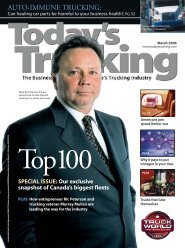Create successful ePaper yourself
Turn your PDF publications into a flip-book with our unique Google optimized e-Paper software.
duty diesels don’t meet the standard just yet, so it’ll use emission<br />
credits to sell older engines for the next few months, buying it<br />
more time to meet EPA’s numbers or fight on in court.<br />
TANKERS: Cylinder trailers appear to be under a lot of<br />
scrutiny by safety officials. As we reported last fall,<br />
Obama’s truck regulators seem bent on implementing<br />
rules that would make tankers far more expensive. One<br />
proposal requires purging of so-called “wetlines” which are located<br />
underside on petroleum containers. It would also require<br />
retrofits and ban wetlines on all future tankers. (<strong>In</strong>dustry folks<br />
say the rule is costly and puts workers at risk). Then at the last<br />
minute, authors of the hazmat safety bill inserted a provision to<br />
examine ways to cut down on cargo tank rollovers as well. The bill<br />
was pending passage at press time. Separately, NHTSA is working<br />
on a rule that could make electronic stability control mandatory<br />
on trailers, beyond tankers. Expect a proposal later this year. (See<br />
pg. 40 for more on this).<br />
UREA: Required for 2010 SCR engines, the liquid is<br />
more accurately named Diesel Exhaust Fluid (DEF)<br />
in North America, but good luck coming up with<br />
something better for “U.” A year ago at this time,<br />
there was plenty of speculation that industry wouldn’t be able to<br />
build the infrastructure to produce, supply and sell urea-based DEF<br />
in time to meet 2010 truck demand. While customers won’t be pining<br />
for more expensive 2010 engines for a while, chemical producers,<br />
OEMs, and truckstops have done an adequate job of ramping<br />
up. Rumors that DEF would cost up to $7 a gallon have also proven<br />
to be far-fetched. It can be had for about three bucks.<br />
Customs remains under pressure<br />
from Homeland Security to improve<br />
container-trailer scanning.<br />
VEHICLE WEIGHTS & DIMENSIONS: When it comes to<br />
environmentally sustainable transportation, governments<br />
talk a good game but are agonizingly slow in<br />
making life easier for truckers to adopt green-friendly<br />
technologies that make actual business sense.<br />
Promoting hybrids and LCVs are lofty goals, but shorterterm,<br />
policy makers need to close the gulf between older VWD<br />
regs and modern, affordable fuel-saving devices like single,<br />
wide-base tires; APUs, and aerodynamic trailer add-ons like<br />
skirts and boat tails as promoted by CTA via its “Envirotruck”<br />
concept. Will truckers be given a break for buying this stuff in<br />
2010? It might be cheaper than flying all those bureaucrats and<br />
NGOs to Copenhagen.<br />
For more details or updates<br />
on any of these issues, GO TO<br />
todaystrucking.com<br />
and use our handy keyword<br />
search function.<br />
WINDSOR: Sure, there isn’t much in the air here<br />
except diesel exhaust but over the last few years the<br />
political drama in this border town has become to<br />
transport writers what the fictional town of Salem is to Stephen<br />
King. There’s no shortage of weird events to scribble about. So, is<br />
2010 the year shovels get in the ground for a new truck bridge to<br />
Detroit? Will American trucking mogul and owner of the private<br />
Ambassador Bridge, Mattie Maroun, continue to launch scuds at<br />
the public bridge process? These and many other questions<br />
answered in the next episode of As Windsor Turns.<br />
X-RAYS: Since 9-11, crossing the border has been about as<br />
fun as crawling under your trailer and measuring the brake<br />
pushrod on a January morning. Weak cross-border volume<br />
has shortened queues a great deal, but the myriad of<br />
draconian security protocols persist. And don’t expect<br />
relief in 2010. <strong>In</strong> December the Government Accountability Office<br />
gave Customs a failing grade for its weak attempt to meet a<br />
Congressional requirement that 100 percent of U.S.-bound cargo<br />
containers be scanned by 2012. Meanwhile, abuse by a few smugglers<br />
of the C-TPAT-FAST system has some officials calling for<br />
tighter controls on that front as well.<br />
YRC: Every month that passes without the yellow submarine<br />
sinking indicates that the LTL giant could survive<br />
after all. The beleaguered carrier, one of the<br />
world’s largest, has been fighting off shark-like pricing<br />
attacks from competitors who’ve been smelling blood in the<br />
water for months. With the help of some “creative” maneuvering<br />
by lenders and creditors, though, Yellow has managed to stay<br />
afloat. Its future, or lack thereof, has significant impact on the<br />
North American LTL sector with possibly over 15 percent of<br />
market capacity up for grabs. Or will the band play on for YRC?<br />
Zzzz: Obstructive sleep apnea (OSA) is quickly<br />
becoming the most scrutinized fatigue-related issue<br />
in the industry. U.S. regulators are working on a<br />
screening rule and if that happens, we’ll have to come<br />
up with a “made-in-Canada” solution that passes<br />
muster with the Americans. Treatment for OSA comes mainly in<br />
the form of CPAP machines, which are effective but existing models<br />
are bulky and uncomfortable for some people. Upon seeing<br />
one for the first time, this writer’s five-year-old asked his grandfather<br />
why he “has to sleep with a vacuum cleaner on his face.”<br />
Drivers with OSA will undoubtedly have similar questions and<br />
regulators should spend the year crafting a reasonable answer. ▲<br />
JANUARY 2010 31



